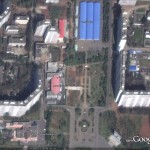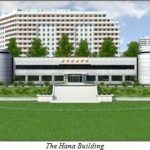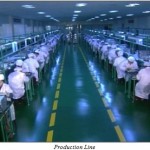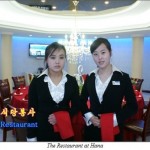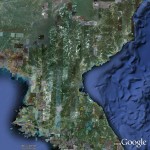UPDATE 2 (2011-9-2): According to KBS:
The Voice of America (VOA) reported Friday that the International Committee of the Red Cross (ICRC) has confirmed that North Korean universities were ordered to suspend studies.
In a report on North Korea covering the first half of 2011, the International Red Cross said that all universities in the Communist nation had been on leave since June to work on construction sites in regions including Pyongyang. The report said the enforced leave of absence will likely continue into April next year during the centennial celebration of the birth of late North Korean founder Kim Il-sung.
VOA said the report appears to have been confirmed by a North Korean authority, as it contained the contact number of a North Korean Red Cross official.
UPDATE 1 (2011-7-11): According to the Daily NK:
Large numbers of additional soldiers and students have been mobilized to try and address the slipping schedule for the construction of 100,000 homes in Pyongyang by 2012, with universities in the capital and some bigger local universities having received a ‘socialist construction mobilization order’ in mid-June.
A Pyongyang source, explaining the situation today, said, “I know that students from universities in Pyongyang like Kim Il Sung University and Kim Chaek University of Technology have been sent to the construction of 100,000 houses. I hear that they will be at the construction site for at least two months or more.”
The mobilization could easily be extended depending on the status of the construction project, he further added.
Another source from North Hamkyung Province reported similar news on the 7th, saying, “Since July, juniors and seniors from No. 1 and 2 Colleges of Education in Chongjin have been mobilized for construction projects under the ‘socialist construction mobilization order,’” and confirming that the students have been sent to Pyongyang.
He went on, “I hear that the center (meaning Party central authorities) notified each university of the number of people required for the Pyongyang construction work. Accordingly, each university selected a certain number of students and sent them to Pyongyang.”
However, the order does not appear to amount to a full, nationwide shutdown of universities. For example, certainly some universities in Yangkang Province have evaded the mobilization order. One college student living in Hyesan, the provincial capital said, “There has been no ‘socialist construction mobilization order’ handed down. We are going on summer vacation in late July.”
Mobilized personnel are reportedly working primarily on construction in neighborhoods where major public works idolizing the Kim family are to be found.
The Pyongyang source reported, “Construction of houses in Changjeon Street, where the Suryeong’s statue is, started in early May. Soldiers have been mobilized to this construction site in large numbers; even some previously involved in construction in the Hyeongjesan district have been in that region for about a week.”
He added, “Equally, the Mansudae region (Kim Il Sung’s birth place) is another place where ‘construction must be completed even if it is not completed elsewhere’, so they have mobilized people from construction sites in other regions.”
According to sources, the pace of construction in those places where soldiers have been mobilized is markedly quicker than elsewhere, although interior construction remains problematic because it calls for special materials.
One source reported, “In Seopo and Hadang 2-dong, where there are soldiers, buildings have already been erected, so people can move in there in August. However, the interiors have not been completed, so people don’t actually want to move in.”
However, on those sites staffed by people from enterprises, events are characterized by a lack of basic materials and the siphoning off of what is available.
The source said, “They are short of materials, while individuals are selling off existing materials and cement to buy rice because the authorities are not providing them with any support. Of the construction overseen by enterprise work units, almost none have been erected. In Hyeongjesan district, with the exception of those sites for which soldiers are responsible, they have only erected the bottom floor.”
According to one source, on April 1st the National Defense Commission ordered, “Complete the construction of 100,000 homes by April 15th, 2012 and get people to move into the new homes without condition.”
However, reports suggest widespread skepticism of this, with one source saying, “According to rumors, there was even a threat, ‘Those in charge of construction who cannot complete it must prepare to leave their posts.’ However, there are many people saying that the 100,000 houses won’t even be done by 2017.”
See more on the priority construction projects here.
ORIGINAL POST (2011-6-30): According to the University World News (thanks to a reader):
Close watchers of North Korean affairs were caught on the hop this week by reports that universities in the hermit kingdom would be closed from 27 June for up to 10 months while students are sent to work on farms, in factories and in construction.
Diplomats in Pyongyang confirmed that students were being drafted into manual labour on the outskirts of the city until April next year to prepare for major celebrations to commemorate the centenary of the late leader Kim Il Sung’s birthday. But they said this did not mean the closure of universities.
Reports originating in South Korea and Japan suggested that the Pyongyang government had ordered universities to cancel classes until April next year, exempting only students graduating in the next few months and foreign students.
The reports said the students would be put to work on construction projects in major cities and on other works in a bid to rebuild the economy. This could indicate that the country’s food crisis and economic problems are worse than previously thought.
Experts on North Korea said full-scale university closures would be unprecedented. However, it was not unusual for students to be engaged in manual labour, with the academic year sometimes shortened in order to send students onto farms and construction sites.
Peter Hughes, British Ambassador to North Korea, told University World News by email from Pyongyang: “There has been no official announcement in DPRK [Democratic People’s Republic of Korea] about university students being sent to carry out manual labour for the next 10 months, but I can confirm that students from all the universities in Pyongyang have been mobilised to work at construction sites in the outskirts of the city until April 2012.
“Some two years ago the DPRK announced that it would build 200,000 units of accommodation in the city to ease the chronic housing shortage. To date only some 10,000 units have been built, so the students have been taken out of universities in order to speed up the construction of the balance before major celebrations take place in April 2012 to commemorate the 100th birthday of the founder of the DPRK, Kim Il Sung.”
Universities are not closed as lecturers and postgraduate and foreign students remain on campuses, Hughes said on Thursday.
“The UK has an English language teacher training programme at three universities in Pyongyang. The mobilisation of the students should not affect this programme as the majority of activity is focused upon teacher development and not teaching students.”
Charles Armstrong, Director of the Centre for Korea Research at Columbia University who returned from Pyongyang earlier last week, said he had visited two state-run universities, Kim Il Sung University and Kim Chaek University of Technology in Pyongyang, as well as the private Pyongyang University of Science and Technology (PUST) in the last few weeks.
At the two public universities the vast majority of students were not present, Armstrong told University World News. “It is also a very busy time for rice transplanting and you see a lot of young people in the fields.”
However, students were studying as normal at PUST, a postgraduate institution funded by Korean-American and South Korean philanthropists that teaches mainly engineering.
“It is very hard to get information in and out of the country and there may be some confusion because every summer students have to go down to the fields to help with the rice planting. It is not the first time that I have heard reports that universities have shut down for a period,” Armstrong said.
“My impression is that there is not a lot going on in terms of teaching and studying in public universities and student time is taken up with ‘extra curricular’ activities including political education. This is a regular part of university life but I have not heard of the universities being shut down completely except for a short while during the 1990s [famine],” he added.
A major famine and economic crisis in the late 1990s meant that much farm equipment went unused and simply rusted in the fields, so the need for manual labour has grown. Students and army recruits are mobilised to help, often having to travel far from where they live.
“My understanding of the university system is that it is largely dysfunctional. Resources are lacking, many professors spend their time earning from private tuition – so my impression is that it would not make a great deal of difference if they are shut down,” said Armstrong.
Aidan Foster-Carter, a writer and researcher on North Korea, formerly at Leeds University in England, said: “North Korea sets great store by these anniversaries. They decreed a few years ago that 2012 would be their date for becoming a great and prosperous nation defined in economic terms. It would make sense having extra persons out there to help with construction, though normally it is the army that does it.”
But any mass use of student labour for longer than the summer vacation months would mean a trade-off against achieving economic goals that required educated workers, he said.
“North Korea’s is a strange and broken economy but they also need educated people to pull them out and it would be a major precedent to close the universities. It could be a sign that they are in a worse mess than we thought.”
Hazel Smith, professor of security and resilience at Cranfield University who also lectures at Pyongyang’s Kim Il Sung University, said North Korean universities were operating as usual in and outside the capital when she was there in May.
She said it would be counterproductive for the regime to close universities. Despite huge labour shortages throughout the country, the regime is “fully aware that people need to be taught IT and technology and of course nuclear [engineering].
“They are dependent to fulfill their economic goals on people who are computer literate and engaged in advanced science. I don’t think [closures] will last very long. There are too many other priorities to deal with.”
Analysts in Japan and South Korea suggested there could be other reasons behind the decision to disperse the students across the country, including the possibility of demonstrations at campuses inspired by the Arab Spring uprisings, which began at universities.
They noted that North Korea had purchased anti-riot equipment from China in recent months, including tear gas and batons, while there has been an increased police presence at key points in Pyongyang in recent weeks.
Foster-Carter said North Korea watchers have been closely monitoring for signs of unrest since the spring, but there had not been any.
“The amount of information from the Middle East reaching the ordinary citizen is very, very limited and there has been nothing at all in the official media,” Armstrong said. “There has been no student unrest that we know of for the last 50 years.”
According to North Korea analysts, party controls are in place to prevent student uprisings, including political indoctrination and strong surveillance. Some analysts said surveillance on campuses had relaxed in recent years because many party officials had not been paid.
However, experts agreed that the possibility of universities being shut would be an ominous sign of tension. “The most likely reason [to shut universities down completely] would be for military mobilisation if they thought they were going to be attacked,” Smith said.
Read the full story here:
North Korea: Learning stops as students sent to work
University World News
Yojana Sharma
2011-6-30

